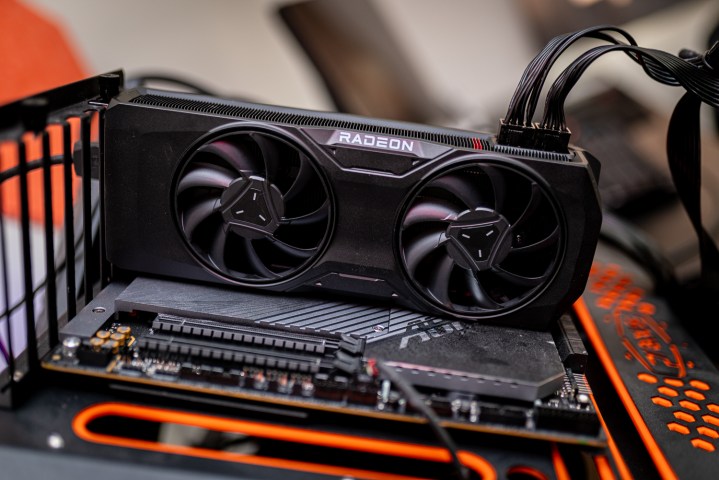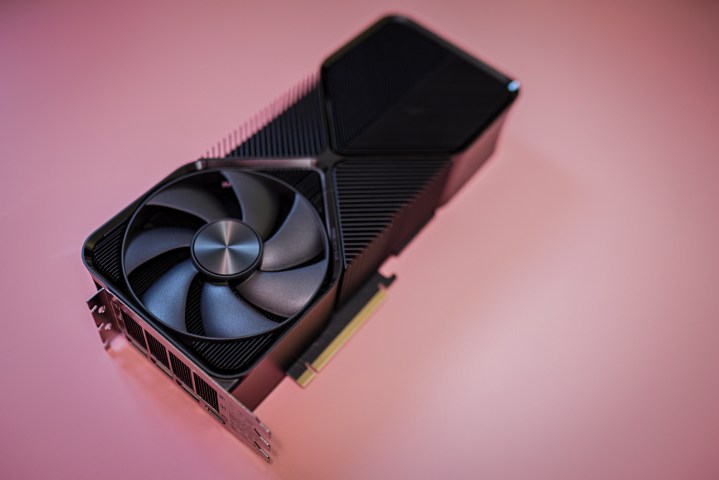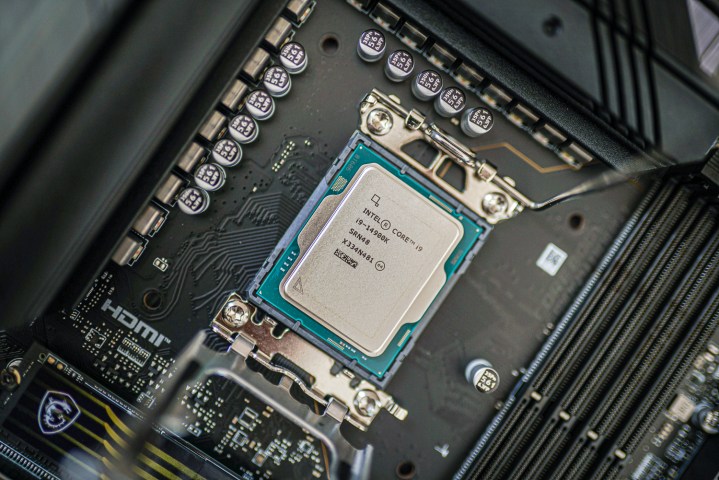Going into 2024, I felt excited. With all the different releases slated for the second half of the year, it looked like 2024 would be a fantastic time for PC hardware. After all, AMD, Nvidia, and Intel were all rumored to launch new products, and you know what that means: lots of competition for who gets to rule the rankings of the best graphics cards and processors.
As we’re now well into the second half of the year, the rumors have grown far less optimistic — as have I. With delays on the horizon, and the ongoing Intel CPU instability crisis, it seems like 2024 may turn out to be a complete downer for PC hardware enthusiasts.
AMD may wait with RDNA 4

AMD’s RDNA 4 turned out to be a great exercise in managing your expectations. A couple of years ago, I remember hearing rumors of RDNA 4 GPUs that would fully utilize a multi-chiplet architecture, hit clock speeds reaching well over 3GHz, and completely destroy Nvidia. The reality is proving to be quite different.
First, the rumor that’s been repeated so often that it feels like it’s all but been confirmed — AMD is not making any high-end GPUs in RDNA 4, so beating Nvidia feels like a pipe dream. In fact, it won’t even top the performance of its own current-gen flagship, the RX 7900 XTX. Various leakers point to the Navi 48 GPU being closer to the RX 7900 XT in performance, although some also say that it might offer better ray tracing.
Still, even if this turns out to be true, there’s no harm in AMD scaling back for a bit. In fact, it might be for the best, given that its gaming revenue is plummeting, and also that it likely wouldn’t have had an answer to Nvidia’s RTX 5090, anyway. I’ve made my peace with the reality that Nvidia will remain king of the hill for the foreseeable future.
There’s more to a GPU’s success than just its raw performance; the timing and the price matter, too. AMD could certainly compete in both aspects. AMD cards have historically been cheaper than Nvidia’s, so that’s almost a given. The timing, too, seemed to work out in AMD’s favor.
Initial leaks have pointed toward AMD launching the Radeon RX 8000 series in the final quarter of 2024. With Nvidia only rumored to release the RTX 5090 and the RTX 5080 in 2024, AMD would rule the mainstream GPU market. Launching anywhere between September and November would’ve given AMD basically zero next-gen competition for a good few months. Let’s not forget that the holiday season is generally a pretty sweet time to be selling anything, PC hardware included.
Unfortunately, it appears that AMD may be giving up on those holiday sales and pushing up RDNA 4 into the first few months of 2025. Hardware leaker Kepler_L2 shared that the flagship Navi 48 will be announced during CES 2025, followed by the more budget-oriented Navi 44 in the second quarter of 2025.
This is just a rumor, as is everything else in relation to RDNA 4. Still, if it turns out to be true, pushing the launch of RDNA 4 would’ve robbed AMD of a good opportunity to one-up Nvidia … if not for the fact that the RTX 50-series may be delayed, too.
Will Nvidia really delay the RTX 50-series?

Nvidia fans are free from the worries that plague AMD enthusiasts — there’s almost no doubt that Nvidia will continue dominating the high-end GPU market. We’ll most likely see an RTX 5090, and perhaps even a new Titan AI GPU, and they’ll probably be every bit as powerful (and expensive) as we all expect them to be.
But the question is, when will Nvidia launch the RTX 50-series? Everyone used to think it’d be this year; now, I’m not so sure.
For months now, leakers have been saying that Nvidia was on track to launch in 2024, with some reports saying that the RTX 5090 and the RTX 5080 would launch late this year. The midrange part of the lineup, starting with the RTX 5070, was said to follow in 2025. It made sense, given that Nvidia is on a two-year release cycle. The RTX 20-series hit the shelves in September 2018, followed by the RTX 30-series in September 2020, and the RTX 40-series in October 2022. Therefore, a launch date around September or October this year would have been in line with Nvidia’s usual schedule.
I think we won't see RTX 50 until CES.
— kopite7kimi (@kopite7kimi) July 22, 2024
I’ve had no reason to doubt that Nvidia would follow its usual pattern, but now, two leakers came forward with information that the RTX 50-series might be delayed. Kopite7kimi on X (formerly Twitter) was the first one to say that Nvidia wouldn’t talk about its next-gen GPUs until CES, which won’t be until January 2025. YouTuber RedGamingTech agreed, citing his own sources.
Why would Nvidia choose to delay its graphics cards? Much like AMD, the decision seems inconvenient from a marketing standpoint — the end of the year is one of the strongest periods when it comes to GPU sales. On the other hand, maybe a company of Nvidia’s caliber can ignore seasonality and simply rely on its brand recognition to drive sales no matter the time of year.
Unlike AMD, there have been hints that Nvidia may be in no hurry to launch the RTX 50-series. Moore’s Law Is Dead said a few months ago that Nvidia would make a big deal out of the RTX 50-series at CES, and that while it technically could release the GPUs in 2024, it might wait until 2025.
Despite the above, I fully expected to see exciting new Nvidia cards later this year; now, it might be late January to February before they hit the market. Nothing is certain right now, but the longer Nvidia stays silent, the more likely it is that the delays are true. September and October are not that far off, and we still haven’t heard a word about Blackwell graphics cards.
Battlemage? Battlemage who?

So, Intel Arc Battlemage. That’s another lineup that I, along with many others, thought we’d see in 2024. Do I still think so? Not so much. Intel’s GPUs are also the biggest enigma of the three, so I suppose anything is possible.
Although the rumor mill is often buzzing with information about new Nvidia and AMD products, as well as new Intel CPUs, it’s often quiet as far as discrete Intel GPUs are concerned. Leakers like Moore’s Law Is Dead and RedGamingTech have said that they haven’t heard much about Battlemage, making it seem like it’s all a bit up in the air.
The little news we do get often doesn’t sound great. Moore’s Law Is Dead said months ago that Intel canceled the laptop versions of discrete Battlemage cards, focusing instead on Xe2 integrated graphics for laptops, while desktops get discrete Battlemage. We’ve also heard that Battlemage may be significantly cut down compared to previous speculations.
In a recent video, RedGamingTech said that we can expect to see two Battlemage dies, and that the flagship model will only sport 32 Xe Cores. That’s the same number as in the Arc A770. Add to that the fact that Intel is said to be sticking to GDDR6 memory (as is AMD), and we’re looking at a GPU that will, once again, be outperformed by its current-gen competitors. The price is Intel’s saving grace, but a bit of good timing wouldn’t hurt. But is there still any hope for Intel to hit that “good timing” before it becomes less than good?

Intel’s Tom Petersen was pretty careful when he spoke about Battlemage in an interview at CES 2024, but he also sounded optimistic. Petersen said that most of the work being done on Battlemage back in January was on the software side, with the majority of the hardware team having moved on to Celestial. Intel is wise to dedicate a lot of time to the software side of things, as Alchemist had many driver issues at the beginning. To give credit where credit is due, Intel did an excellent job of fixing those problems, and the GPUs are now stable. But they’re far behind their current-gen competitors, not to mention next-gen.
There have been whispers about Intel aiming to launch Battlemage before Black Friday to prepare for the holiday season. At this point, I’m not sure what to believe. If Intel does manage to get Battlemage on the shelves this year, while AMD and Nvidia lag behind, it might score sales that it wouldn’t have gotten otherwise — so it should have every reason to try.
It’s not just GPUs

Without beating around the bush, graphics cards are turning out to be quite a disappointment this year. Sure, we’ve had the RTX 40-series refresh in January, but the back half of 2024 might prove to be a complete disappointment. Unfortunately, it’s not just GPUs.
Gamers, game devs, and even server hosts have all been dealing with Intel’s 13th- and 14th-gen CPUs crashing. The problem appears to be increasing in volume, and up until recently, Intel mostly stayed silent on the matter. Despite BIOS updates and a recommendation to avoid overclocking, many CPUs — chiefly the Core i9-13900K and the Core i9-14900K — have been crashing. Now, Intel shared an update, but there’s been no definite fix as of yet.
Meanwhile, AMD appears to be trying to avoid sharing the same fate as Intel. The company just announced that it’s delaying its upcoming Zen 5 processors by up to two weeks, pushing the launch date from July 31 to August 8 and August 15. AMD is recalling the CPUs that have already been shipped, including those that are already with system providers.
It’s not clear why AMD is delaying Ryzen 9000 CPUs, but it’s unlikely to be anything as major as what Intel is dealing with — that would take far more than two weeks to resolve, clearly. However, with instability on Intel’s side and delays on AMD’s, the CPU market hasn’t been all sunshine and rainbows lately, either.
It’s too soon to despair about the state of things — we may yet see some exciting new releases in 2024. However, I’m nowhere near as certain as I was when the year was just beginning, and it’d certainly be a letdown to have another full year go by without a new generation of GPUs to look forward to.





